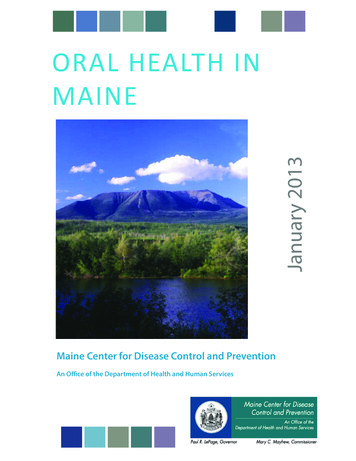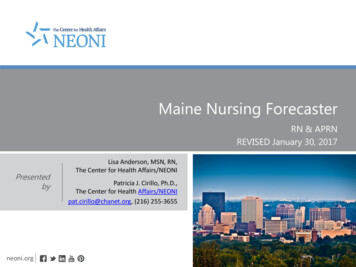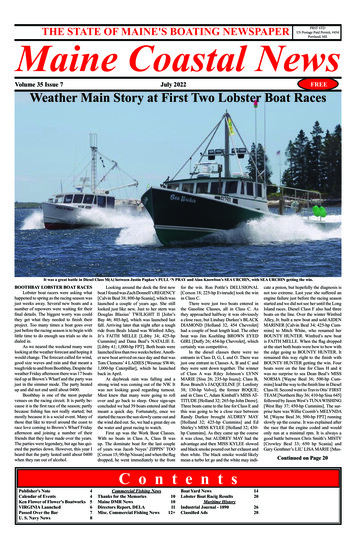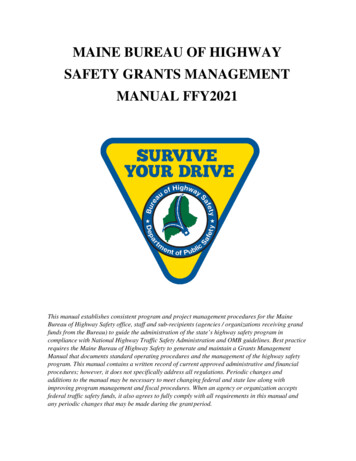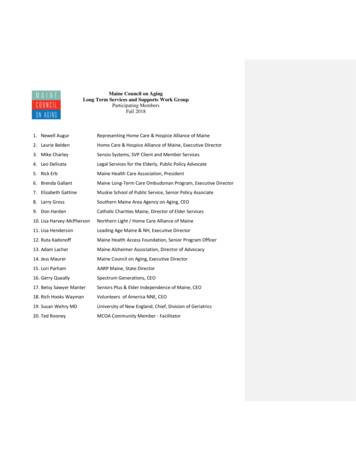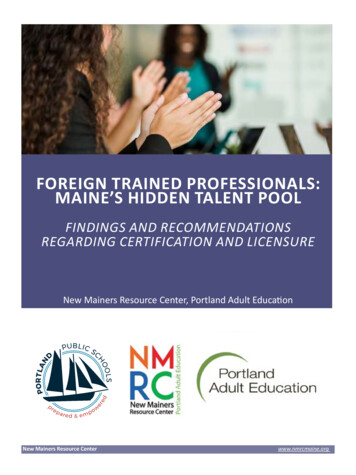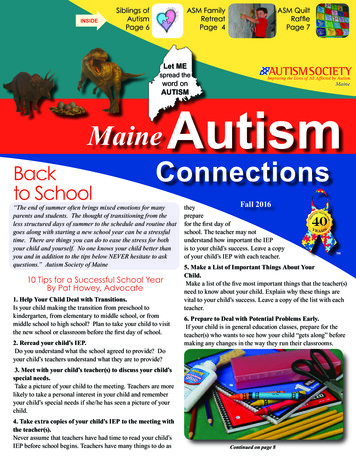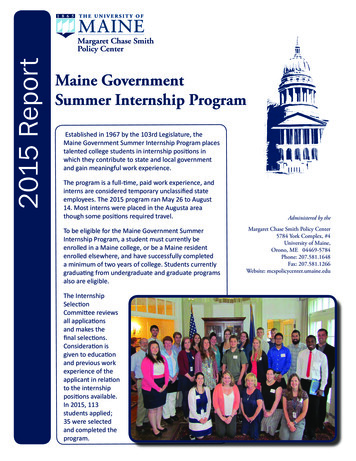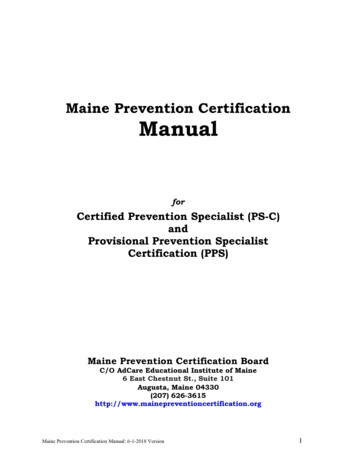
Transcription
Maine Prevention CertificationManualforCertified Prevention Specialist (PS-C)andProvisional Prevention SpecialistCertification (PPS)Maine Prevention Certification BoardC/O AdCare Educational Institute of Maine6 East Chestnut St., Suite 101Augusta, Maine 04330(207) gMaine Prevention Certification Manual: 6-1-2018 Version1
Table of ContentsPurpose of Certification. . .Page33General Information. . . .3o Fees. . . .3o Definitions . . 3o Overview of the Certification Process 3Certification Requirements for Certified Prevention Specialist (PS-C). .6o Experience and Supervision Requirements. . 6o Education/training Requirements. . 7o Exam Requirement. . . 8o Code of Ethics Agreement. .8o Application and References. . .Certification Requirements for Provisional Prevention Specialist (PPS). 8Overview of Maine Prevention Certification Board. . . .9International Certification and Reciprocity Consortium(IC&RC) Description and Role. . 10o IC&RC Mission. .10o Membership. .10o Reciprocity. .10o IC&RC On-line Examination. .10IC&RC Prevention Performance Domains. .12Ethics for Prevention Professionals: Code of Ethics 14Recertification Requirements. .16Expiration of Certification. . .17Voluntary Inactive Status. . .18Revocation of Certified Prevention Specialist or Provisional Prevention SpecialistStatus . . .19Glossary of Terms. 22Application Checklist. .23Fee Schedule. .24Maine Prevention Certification Manual: 6-1-2018 Version2
MAINE PREVENTION CERTIFICATION BOARD (MPCB)OVERVIEWThe Maine Prevention Certification Board is a peer-led organization, serving andrepresenting prevention professionals under the sponsorship of AdCare EducationalInstitute of Maine. The certification board is committed to setting, monitoring and enforcingstandards for prevention professionals to ensure the public’s protection and enhance theprofession. The board is a proud member of the International Certification & ReciprocityConsortium (IC&RC), which establishes standards and facilitates reciprocity for thecredentialing of prevention professionals.CERTIFICATION PURPOSE1. To protect the public through the assurance of competency in prevention services.2. To promote the delivery of competent, professional prevention services.3. To establish a recognized credential of professional competency, which allows fornational reciprocity.4. To promote the credibility and continued professional development of preventionprofessionals.GENERAL INFORMATION1. FEES - See attached Fee Schedule on the last page of this manual.2. DEFINITIONSPrevention: A proactive process which empowers individuals and systems to meet thechallenges of life events and transitions by creating and reinforcing healthy behaviorsand lifestyles and reducing risks contributing to alcohol, tobacco, and other drugmisuse and related issues. Prevention focuses on the interventions that occur prior tothe onset of a substance use disorder and which are intended to prevent the occurrenceof the substance use disorder or reduce risk for the substance use disorder.Certified Prevention Specialist (PS-C): A professional who uses a specialized set ofknowledge, experience, training and skills to encourage healthy attitudes and behaviorswhich prevent the abuse of alcohol, tobacco and other drugs (ATOD). The role of theCertified Prevention Specialist, as defined by the six Prevention Performance Domains,is to empower individuals and communities to assess needs and to develop andimplement strategies that effectively meet those needs.Provisional Prevention Specialist (PPS): A prevention worker who has received aprovisional certification in order to acquire the experience and education necessary toapply for certification as a Certified Prevention Specialist. This entry-level certificationis not reciprocal with any other state or nation and does not require an examination. Itcan be renewed once (if PPS re-certification requirements are met) and entails acommitment to seek the experience and education/training required for the CertifiedPrevention Specialist status.3. OVERVIEW of the CERTIFICATION PROCESSThis manual describes the requirements and procedures for becoming a CertifiedPrevention Specialist (PS-C) and a Provisional Prevention Specialist (PPS). downloads/Maine Prevention Certification Manual: 6-1-2018 Version3
Recertification for the Certified Prevention Specialist credential is required every twoyears. To fulfill recertification requirements, candidates must complete an additionalforty (40) hours of continuing education in the area of ATOD prevention. ProvisionalPrevention Specialists must work on obtaining the education and experience required tobecome a Certified Prevention Specialist. The Provisional Prevention Specialistcredential can be renewed one time as long as the applicant meets certainrecertification requirements. Re-Certification materials are available for download at theMPCB website: All experience and education/training required for certification is based on the sixIC&RC Prevention Performance Domains (defined on pages 12-13):1.2.3.4.5.6.Planning and EvaluationPrevention Education and Service DeliveryCommunicationCommunity OrganizationPublic Policy and Environmental ChangeProfessional Growth and ResponsibilityThe application process for the CERTIFIED PREVENTION SPECIALIST (PS-C) hastwo primary steps:1. Submission of a complete application for Certified Prevention Specialistcertification: Experience, supervised practical experience, education/training,adherence to the Code of Ethical Standards, and a statement that the applicant livesor works in Maine 51% of the time must be provided using the forms in the PS-CApplication Packet. Three references are also required, using the form included inthe application packet. Applications may be submitted electronically or mailed tothe MPCB in hard copy form. An application is good for six months from the date itis signed.A non-refundable 150.00 fee is required at the time of application. The certificationfee includes processing the application and two years of certification. A separate 125.00 IC&RC examination fee is paid when the applicant has scheduled anappointment for the test. An additional 125.00 fee will be necessary for applicantswho re-take the exam within 6 months of the initial exam date. Incompleteapplications will be returned for completion and a 25.00 fee will be assessed foreach subsequent review. Fees may be paid electronically or by check. See the g/payment/).2. Successful completion of the IC&RC Prevention Specialist Exam: The IC&RCexam is taken on-line at an approved testing center after the Maine PreventionCertification Board has provided the applicant access to an IC&RC on-linescheduling utility. Testing Window Policy: Candidates approved to sit for the examwill have 12 months from the date their application is approved to take the exam.Your certification is not effective until the Maine Prevention Certification Board hasapproved your application and you have passed the IC&RC Prevention Specialistexam.Maine Prevention Certification Manual: 6-1-2018 Version4
The application process for the PROVISIONAL PREVENTION SPECIALIST (PPS) hasone step:1. Submission of a Complete Application for Provisional Prevention Specialistcertification: This application contains an application form and forms for listingexperience and education. Because there are no experience or educationrequirements for a PPS, this information does not need to be documented. Finally, asigned form affirming that you will adhere to the Code of Ethical Standards isrequired. Applications may be submitted electronically or mailed to the MPCB inhard copy form.A non-refundable 50.00 fee, required at the time of application, includes processingand two years of certification. Fees may be paid electronically or by check. See thepayment dropdown menu on the g/payment/) for instructions.Certification Period The Maine certification period for both the Certified PreventionSpecialist and the Provisional Prevention Specialist is two calendar years, beginning onthe first day of the month that follows approval by the Maine Prevention CertificationBoard. Dates are printed on the certificate. The recertification fee for the CertifiedPrevention Specialist is 75.00 for two years. Please note the following new ProvisionalPrevention Specialist requirements: As of March 1, 2018, a Provisional PreventionSpecialist must have completed the following requirements in order to apply for anadditional two years of Provisional Prevention Specialist status. The recertification feefor the Provisional Prevention Specialist is 50.00 for the one renewal that is allowed.Please keep these requirements in mind as you begin to acquire theeducation/training and the experience needed to become a Certified PreventionSpecialist.o 31 hours (26 in-person and five (5) online) must be obtained through the SubstanceAbuse Prevention Specialist Training (SAPST or MPCB-approved SAPST equivalent),and six (6) hours of Prevention Ethics must be taken within the first year of PPScertification.o An additional 12 hours of training in Alcohol, Tobacco and Other Drugs (ATOD) mustbe completed within the first two years of PPS certification.Assistance with the general process can be found in two ways:1. Application ChecklistAn Application Checklist is included in the application packet. Use the checklist asan overview to begin and as a final check to be sure your application is complete.2. QuestionsQuestions about the certification process should be directed to the Maine PreventionCertification Board at the address below:Maine Prevention Certification BoardC/O AdCare Educational Institute of Maineat The Ballard Center6 E. Chestnut St., Suite 101, Augusta, Maine 04330Phone: (207) 626-3615, Website: info@mainepreventioncertification.orgMaine Prevention Certification Manual: 6-1-2018 Version5
CERTIFICATION REQUIREMENTS for CERTIFIEDPREVENTION SPECIALIST (PS-C)1. EXPERIENCE REQUIREMENTSCertified Prevention Specialist Candidates must have 2,000 documented hoursof prevention-related experience in the IC&RC Prevention Performance Domains(pages 12-13). Of those 2,000 documented hours, a minimum of 120 hours ofsupervision is required, with at least 10 hours in each domain. A minimum of 500(25%) of the required 2,000 hours must be specific to alcohol, tobacco or otherdrugs (ATOD) prevention.Experience Defined/Types of Experience: Experience may come from internships/practicums and paid or voluntary workhours. Experience and supervision must be gained from a position in which the jobdescription includes prevention (see page 3 for prevention definition).Calculating Hours of Experience:Hours of experience are based on actual time worked, interned or volunteered.Hours are calculated based on start/end dates and average weekly schedule. Thefollowing equivalents will help you to calculate hours of experience: 1 year of full-time employment/volunteering 2,000 hours 1 month of full-time employment/volunteering 167 hours 1 week of full-time employment/volunteering 40 hoursFor example, if an individual worked half-time (20 hours per week) for a full year,they would accumulate 1,000 hours of experience.Documenting Experience and Hours of Supervision:Total Hours: Total experience hours must be documented on the Documentation of Experienceform included in the application materials. This form must be signed by asupervisor or program director.Supervised Hours: Supervised hours must be documented on the Documentation of Supervision formfound in the application packet. Each supervisor must complete and sign aseparate form.Maine Prevention Certification Manual: 6-1-2018 Version6
2. EDUCATION/TRAINING REQUIREMENTSCertified Prevention Specialist Candidates must have a total of 120 hours ofdocumented education/training, according to the breakdown specified below.24 hours must be related to ATOD, Six (6) to Prevention Ethics, and 31 hours (26in-person and five (5) online) must be obtained through the “Substance AbusePrevention Specialist Training” (SAPST). An applicant may substitute 31 hours ofthe 3-week (96 hour) CADCA National Coalition Institute (aka the National TrainingAcademy) for SAPST, as long as they have attended all three weeks of training.Another SAPST alternative for an applicant is to attend the University of Maine atFarmington (UMF) HEA 211 Substance Abuse Prevention course taught by RobertRogers, Certified SAPST Instructor, or another SAMHSA-approved certified SAPSTinstructor. Applicants MUST have perfect attendance at all classes, a certificate ofcompletion from the Introduction to Substance Abuse Prevention online course, anda certificate of completion from the in-person UMF Substance Abuse Preventioncourse. The remaining “other hours” of education/training must be related to the sixIC&RC Prevention Domains. Detail on the domains can be found in a tablebeginning on page 12. This table also lists the weight each domain is given on theIC&CR exam, which may help candidates to choose the education/training hoursthey pursue. The grand total will be 120 hours:ATODHours24 EthicsTrainingHours6 SAPSTTrainingHours31OtherHours 59TOTALHours 120Education Defined/Types of Education:Education is defined as formal, structured instruction in the form of workshops,seminars, institutes, in-service training, college/university credit courses, andMaine Prevention Certification Board approved distance education.Courses or Continuing Education Units from an accredited college oruniversity: You may submit undergraduate or graduate coursework for credittowards the required hours. One credit hour 15 contact hours or 3 Credit hours 45 contact hours, as long as all the hours in the course are relevant. If not, youmust select the hours that are relevant to the hours claimed on the form.Online Trainings/Webinars: Online trainings/webinars can be applied toward theeducation requirement.Pre-Approved Training for Prevention Specialists: Trainings that are endorsed orsponsored by the following organizations are automatically pre-approved: International Certification & Reciprocity Consortium (IC&RC) Center for Substance Abuse Prevention (CSAP) SAMHSA’s Center for the Application of Prevention Technologies (CAPT) Community Anti-Drug Coalitions of America (CADCA)A list of Pre-Approved training opportunities can be found on the MPCBwebsite: ourses/Whenever possible the education/training for initial certification should be from preMaine Prevention Certification Manual: 6-1-2018 Version7
approved sources. All workshops, in-service education, online training, or collegecourse certificates of completion that are not pre-approved by the MPCB must besubmitted with a syllabus, agenda, or description from the training as proof of itsappropriateness.Trainings without Pre-Approval Status: Trainings that are relevant to Alcohol,Tobacco, and Other Drug (ATOD) prevention and/or the IC&RC PreventionPerformance Domains can be applied toward the education/training requirement forcertification or re-certification. If these trainings are not included in the “ApprovedTrainings” list, the MPCB reserves the right to ask for additional information todetermine the applicability of training/education for Prevention Specialistcertification.Calculating Hours of Education: The following will help to calculate hours ofeducation: 1 Credit Hour/Contact Hour 1 CEU 1 hour of education forcertificationDocumenting Education: Education hours by discipline must be documented onthe Maine Certified Prevention Specialist Education Documentation form in theapplication packet and accompanied with certificates of completion for eachdocumented training/workshop. Any education event listed that does not have therequired documentation will not be considered. It is the responsibility of theapplicant to provide the required documentation.Undocumented Events: If you do not have certificates of completion for one ormore workshops, you must fill out the form titled Education Form for UndocumentedEvents included in the application materials. Your supervisor or program directormust sign this form to verify that you have attended the listed workshops. Listingeducation on this form should be the exception in your documentation. Only 15%(18 hours for initial certification or 6 hours for recertification) of total education canbe applied with this form. You should make every effort to locate missing verificationof educational hours before using this form. This form can also be used to documentin-service trainings.3. IC&RC EXAMINATION REQUIREMENTTo become a Certified Prevention Specialist, an applicant must pass a PreventionSpecialist Examination administered by IC&RC. Detailed information on the IC&RCbegins on page 10. This section describes both reciprocity and the IC&RC examinationrequirement (in the yellow shaded box on pages 10-11).4. AGREEMENT TO ABIDE BY THE CODE OF PREVENTION ETHICSTo become a Certified Prevention Specialist, an applicant must sign an Agreement toAbide by the Code of Ethical Standards Form (in the application packet).5. CERTIFIED PREVENTION SPECIALIST APPLICATION FORM AND REFERENCESThe Application Form for Certified Prevention Specialist Certification can be found in theapplication packet along with the forms for documenting experience andeducation/training. A References Form with instructions is also included.Maine Prevention Certification Manual: 6-1-2018 Version8
CERTIFICATION REQUIREMENTS for PROVISIONALPREVENTION SPECIALIST (PPS)A Provisional Prevention Specialist receives a provisional certification in order to acquirethe experience and education necessary to apply for certification as a Certified PreventionSpecialist. This entry-level certification is not reciprocal with any other state or nation anddoes not require an examination. This certificate is good for two years. Holders of a PPScertificate will have the OPTION TO RENEW this status ONE TIME if PPS re-certificationrequirements are met. PPS re-certification requirements are listed below, in item #4.1. EXPERIENCE REQUIREMENTSThere is no experience requirement for an applicant to become a ProvisionalPrevention Specialist.The only requirement is that the Provisional Prevention Specialist (PPS) applicant signs anagreement to work toward obtaining the experience needed to become a Certified PreventionSpecialist (PS-C). It entails a commitment to seek the experience and education/trainingrequired for the Certified Prevention Specialist certification. Detail on the experience thatthe applicant will commit to acquire can be found in the description of PS-C experiencerequirements in the blue shaded box on page 6.2. EDUCATION/TRAINING REQUIREMENTSThere is no minimum education/training requirement for an applicant to become aProvisional Prevention Specialist.The only requirement is that the Provisional Prevention Specialist (PPS) applicant signs anagreement to work toward obtaining the education/training needed to become a CertifiedPrevention Specialist (PS-C). Detail on the education/training that the applicant willcommit to acquire can be found in the description of PS-C education/training requirementsin the green shaded box on pages 7 and 8.3. PROVISIONAL PREVENTION SPECIALIST (PPS) APPLICATION FORMThe application form for Provisional Prevention Specialist certification can be found in theProvisional Prevention Specialist Application Packet.4. PROVISIONAL PREVENTION SPECIALIST (PPS) RE-CERTIFICATIONREQUIREMENTS **Effective March 1, 2018**As of March 1, 2018, a Provisional Prevention Specialist must have completed the followingrequirements in order to apply for an additional two years of Provisional PreventionSpecialist status. The recertification fee for the Provisional Prevention Specialist is 50.00for the one renewal that is allowed. Please keep these requirements in mind as you begin toacquire the education/training and the experience needed to become a Certified PreventionSpecialist.o 31 hours (26 in-person and five (5) online) must be obtained through the SubstanceAbuse Prevention Specialist Training (SAPST) or MPCB-approved SAPST equivalentand six (6) hours of Prevention Ethics must be taken within the first year of PPScertification.o An additional 12 hours of training in Alcohol, Tobacco and Other Drugs (ATOD) mustbe completed within the first two years of PPS certification.Maine Prevention Certification Manual: 6-1-2018 Version9
INTERNATIONAL CERTIFICATION & RECIPROCITYCONSORTIUM (IC&RC)The International Certification and Reciprocity Consortium (IC&RC) is a leader in thedevelopment of credentialed professionals. Its mission is to establish, monitor, andadvance reciprocal competency standards for credentialing of professionals engaged inprevention and treatment of substance use disorders and related problems.1. MEMBERSHIP Maine is a member of the International Certification and ReciprocityConsortium (IC&RC). Membership in IC&RC allows Maine Certified Prevention Specialiststo receive reciprocal certification in other IC&RC member states and countries. A list ofreciprocal locations can be found at offering-reciprocity/2. RECIPROCITYA. Definition Each certifying body (including the Maine Prevention Certification Board)that belongs to the IC&RC agrees to use the IC&RC’s minimum standards forreciprocity-eligible certifications. Each IC&RC member board agrees to accept thereciprocity-eligible certification(s) of other IC&RC member boards.IC&RC member boards can offer certifications that are not reciprocity-eligible aswell. In Maine, the Provisional Prevention Specialist certification is not reciprocalwith other IC&RC member boards.B. To Apply for Reciprocity Contact the Maine Prevention Certification Board for anIC&RC reciprocity application for the Certified Prevention Specialist certification.Before mailing the reciprocity application and fee to IC&RC, verify that thecertification board to which you are applying offers a reciprocity-eligible PreventionSpecialist certification by contacting the Maine Prevention Certification Board.3. IC&RC ON-LINE EXAMINATIONA. Examination ContentThe exam consists of 150 multiple-choice questions. The IC&RC PreventionPerformance Domains addressed in the exam are as follows:1.2.3.4.5.6.Planning and EvaluationPrevention Education and Service DeliveryCommunicationCommunity OrganizationPublic Policy and Environmental ChangeProfessional Growth and ResponsibilityA complete description of each of the six IC& RC Prevention PerformanceDomains and its weight on the exam can be found on pages 12 and 13 ofthis manual.Maine Prevention Certification Manual: 6-1-2018 Version10
C. References for the IC&RC Exam1. A complete list of references for studying for the IC&RC exam can bedownloaded from the Maine Prevention Certification Board website c-exam-info/2. The CANDIDATE GUIDE for the IC&RC Prevention SpecialistsExamination, a publication available at no cost through the MainePrevention Certification Board website, provides a great deal ofinformation about the exam, including information on contents,scheduling, and sample questions.3. The Rhode Island Prevention Specialist Certification: Study Guidefor the Certification Exam is also available for download on the MPCBwebsite. Although this guide was specifically developed for use by thoseseeking certification in Rhode Island, this guide is applicable to anyonepreparing for IC&RC's Prevention Specialist Exam.4. A Practice Exam is available for a fee. The practice exam was developedby the IC&RC to assist candidates with examination prep and mimic thetesting platform used by IC&RC.D. Examination DatesAll examinations are administered on-line at approved testing centers. Theyare available any time the centers are open, but must be scheduled inadvance. Maine has two testing centers, in Auburn and Bangor.E. Examination Registration and FeesAfter the state board has provided approval to IC&RC, applicants are givenaccess to an online site to register for the exam. The fee for the IC&RCPrevention Specialist Examination is 125.00. An additional charge of 125.00will be assessed if you are re-taking the exam.F. Special CircumstancesIndividuals with disabilities who require modifications in test administrationmay request specific procedural changes through submission of a SpecialAccommodations form. This form can be downloaded from the MainePrevention Board website -exam-info/.Maine Prevention Certification Manual: 6-1-2018 Version11
IC&RC PREVENTION PERFORMANCE DOMAINSDomain 1: Planning and EvaluationWeight on Exam: 30% Determine the level of community readiness for change.Identify appropriate methods to gather relevant data for prevention planning.Identify existing resources available to address the community needs.Identify gaps in resources based on the assessment of community conditions.Identify the target audience.Identify factors that place persons in the target audience at greater risk for the identifiedproblem.Identify factors that provide protection or resilience for the target audience.Determine priorities based on comprehensive community assessment.Develop a prevention plan based on research and theory that addresses communityneeds and desired outcomes.Select prevention strategies, programs, and best practices to meet the identified needs ofthe community.Implement a strategic planning process that results in the development andimplementation of a quality strategic plan.Identify appropriate prevention program evaluation strategies.Administer surveys/pre/posttests at work plan activities.Conduct evaluation activities to document program fidelity.Collect evaluation documentation for process and outcome measures.Evaluate activities and identify opportunities to improve outcomes.Utilize evaluation to enhance sustainability of prevention activities.Provide applicable workgroups with prevention information and other support to meetprevention outcomes.Incorporate cultural responsiveness into all planning and evaluation activities.Prepare and maintain reports, records, and documents pertaining to funding sources.Domain 2: Prevention Education and Service DeliveryWeight on Exam: 15% Coordinate prevention activities. Implement prevention education and skill development activities appropriate for thetarget audience. Provide prevention education and skill development programs that contain accurate,relevant, and timely content. Maintain program fidelity when implementing evidence-based practices. Serve as a resource to community members and organizations regarding preventionstrategies and best practices.Domain 3: CommunicationWeight on Exam: 13% Promote programs, services, activities, and maintain good public relations. Participate in public awareness campaigns and projects relating to health promotionacross the continuum of care. Identify marketing techniques for prevention programs.Maine Prevention Certification Manual: 6-1-2018 Version12
Apply principles of effective listening.Apply principles of public speaking.Employ effective facilitation skills.Communicate effectively with various audiences.Demonstrate interpersonal communication competency.Domain 4: Community OrganizationWeight on Exam: 15% Identify the community demographics and norms. Identify a diverse group of stakeholders to include in prevention programmingactivities. Build community ownership of prevention programs by collaborating withstakeholders when planning, implementing, and evaluating prevention activities. Offer guidance to stakeholders and community members in mobilizing for communitychange. Participate in creating and sustaining community-based coalitions. Develop or assist in developing content and materials for meetings and other relatedactivities. Develop strategic alliances with other service providers within the community. Develop collaborative agreements with other service providers within the community. Participate in behavioral health planning and activities.Domain 5: Public Policy and Environmental ChangeWeight on Exam: 12% Provide resources, trainings, and consultations that promote environmental change.Participate in enforcement initiatives to affect environmental change.Participate in public policy development to affect environmental change.Use media strategies to support policy change efforts in the community.Collaborate with various community groups to develop and strengthen effective policy.Advocate to bring about policy and/or environmental change.Domain 6: Professional Growth and ResponsibilityWeight on Exam: 15% Demonstrate knowledge of current prevention theory and practice.Adhere to all legal, professional, and ethical principles.Demonstrate cultural responsiveness as a prevention professional.Demonstrate self-care consistent with prevention messages.Recognize importance of participation in professional associations locally, statewide,and nationally.Demonstrate responsible and ethical use of public and private funds.Advocate for health promotion ac
Prevention Specialist requirements: As of March 1, 2018, a Provisional Prevention Specialist must have completed the following requirements in order to apply for an additional two years of Provisional Prevention Specialist status. The recertification fee for the Provisional Prevention Specialist is 50.00 for the one renewal that is allowed.
